Connecting in North Carolina Tour Showcases University Outreach and Engagement in Parks, Recreation and Tourism
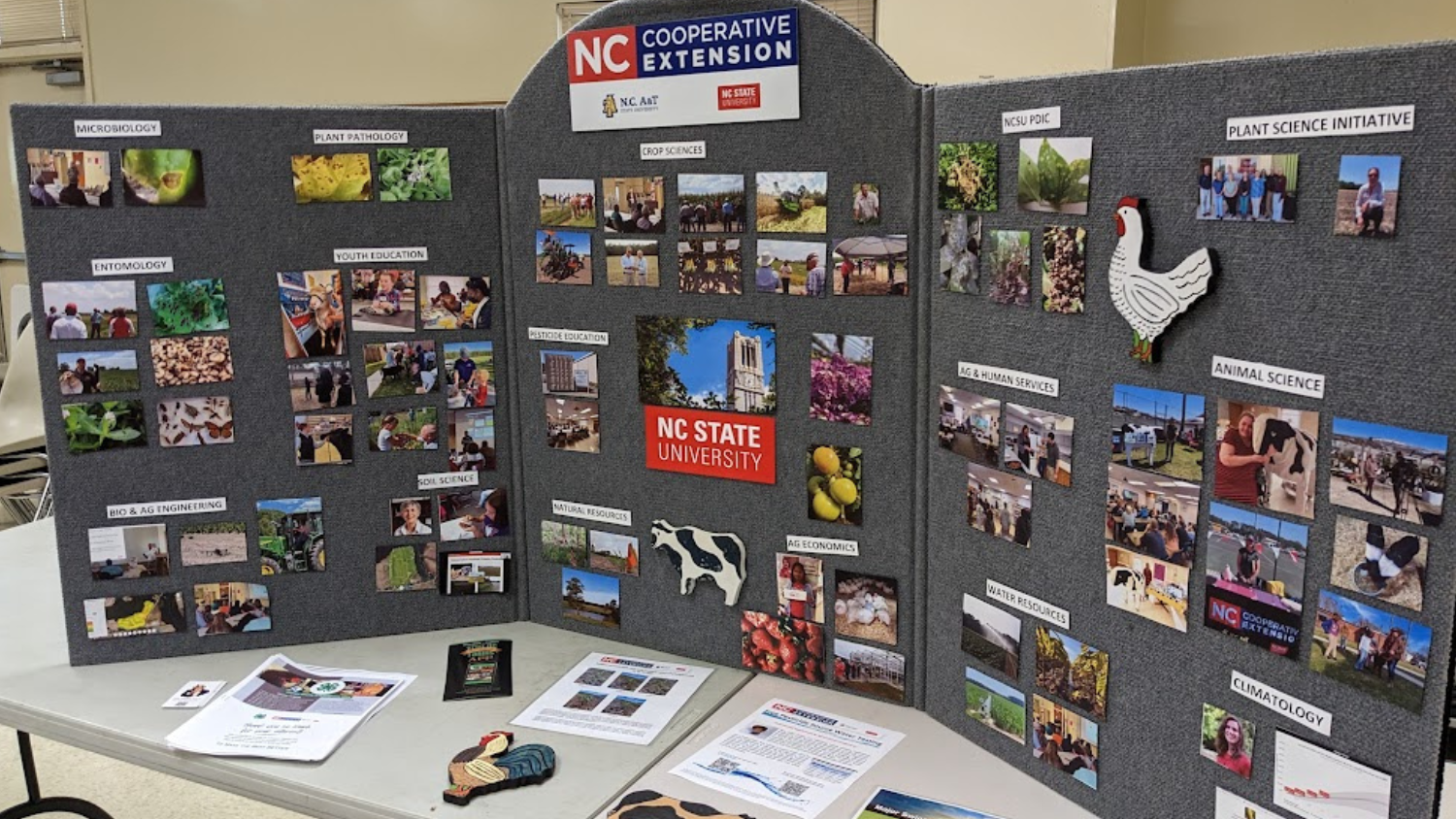
The Connecting in North Carolina (CINC) Tour is an opportunity for new faculty/staff to gain a better understanding of the University’s outreach across counties and the impacts of those efforts, and put a face to the people doing the work and making an impact on their county and region.
“The creation of this university was to allow the public access to education,” said Rich Bonanno, vice provost for outreach and engagement at NC State. “Our overall work in outreach and engagement across campus is to help fulfill the land-grant mission. NC State has so much to offer in sharing our knowledge beyond our campus borders.”
This year’s tour took place June 6-7, with visits throughout Eastern North Carolina, and included several visits to counties where NC State faculty and students are engaging with the public to educate, establish, or enhance places and programming. ” The first stop on the tour was at Princeville Elementary School in Edgecombe county where visitors were greeted by Valerie Bridges, an NC State alum and former superintendent of Edgecombe County Public Schools and Glenda Lawrence-Knight, town manager and lifelong resident of Edgecombe county.
Partnership and education seed resilience with Princeville Elementary School community
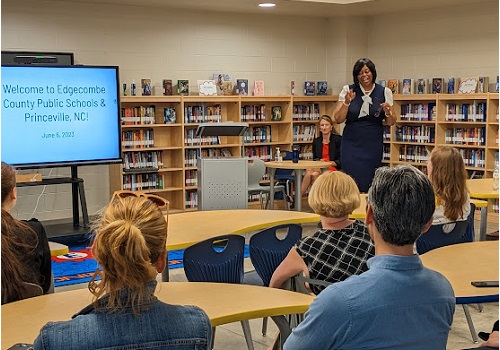
Originally called Freedom Hill, the town of Princeville is the first town in the United States settled by former slaves at the close of the Civil War. Few communities have struggled like Princeville. Both Bridges and Knight explained how the town sits adjacent to the Tar River and is vulnerable to flooding due to the elevation.
“Like many African-American communities, the land available to Princeville’s first residents was marshland,” said Lawrence-Knight, ” so it was unsuitable for agriculture and highly susceptible to flooding.”
Before Hurricane Floyd swallowed up the town in 1999, the town had been hit by floods or “high water” on at least five other occasions since its founding, yet resilience has long characterized the community and its people.

Bridges explained how the Princeville Board of Commissioners approved a “Floodprint” to help residents live with flood risks while enhancing its historic center and economic future. The plan is the result of years of collaborative work with town leaders and residents and partnership with NC State’s Coastal Dynamics Design Lab, Conservation Corps of North Carolina, and Conservation Trust for North Carolina.
With NC’s Year of the Trail in mind, the town is also working with NC State and partners to build The Heritage Trail, a nature trail built by youth crews to educate residents and visitors about nature and the role of water in the community.
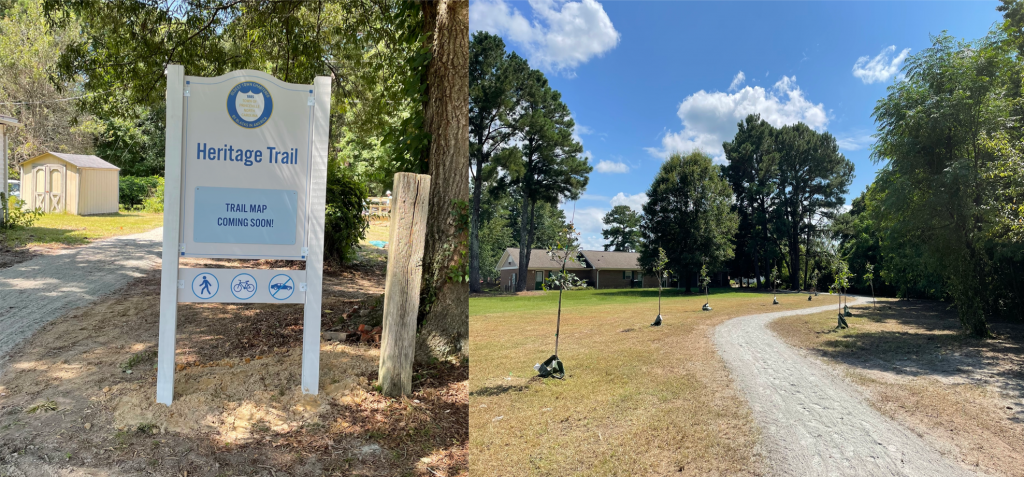
CMAST: A center for regional research and collaboration
About 150 miles from Raleigh, NC State’s Center for Marine Sciences and Technology (CMAST) offers students unique experiences that further the University’s research and outreach mission. Located in a unique position to host marine science programs, CMAST provides a variety of programs including the Shellfist Pathology Program which leads research, education, and extension programs focused on understanding and managing pathogen and disease impacts to shellfish aquaculture and fisheries.
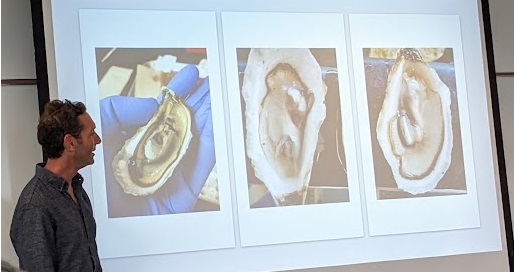
David Eggleston, director of CMAST, gave an overview of the center and how they are working to address the growing needs of the shellfish industry including keeping North Carolina oysters healthy. Tal Ben-Horin, assistant professor at NC State, explained shellfish pathology and current research on protecting the water quality for oysters and maintaining oyster sanctuaries.
North Carolina oysters are enjoyed by locals and tourists alike and professors in the department of parks, recreation and tourism management (PRTM) partner with CMAST, the North Carolina Coastal Federation and North Carolina Sea Grant to administer the NC Oyster Trail.
Tourism Extension provides resources and agents across North Carolina
Associate professor, Whitney Knollenberg and extension associate, Ann Savage are directly involved in promoting the NC Oyster Trail along with the planning and policies that facilitate sustainable tourism development throughout the state.
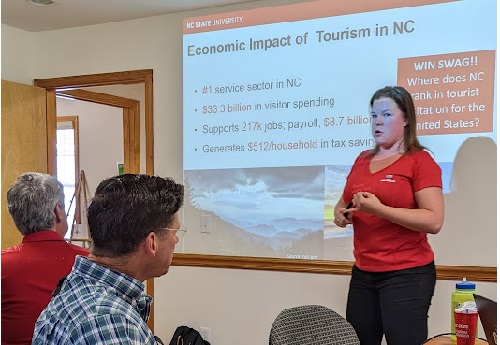
During a tour stop at Hoffman Forest in Jones and Onslow counties, Knollenberg engaged attendees with the latest economic impact measures for the NC tourism industry. She also explained how PRTM students learn about sustainable tourism and ensuring the positive impacts are felt by all stakeholders.
With coastal tourism in mind, emeritus professor Gene Brothers, shared the success of Vacation Supported Agriculture (VSA), a project led by NC State’s P1tLab and NC State Extension (Local Foods, Community Development, and Tourism Extension). The program was created to connect small farmers with new opportunities to increase farm revenue through direct sales of fresh produce to vacationers during their stay in coastal communities.
Making master gardeners and protecting NC youth
This CINC tour included visits to the Craven County center in New Bern and the Lenoir County center in Kinston. A popular outreach program at most NC Cooperative Extension centers is the master gardener programs that offer information, training, and gardening classes along with a community garden for display and education.
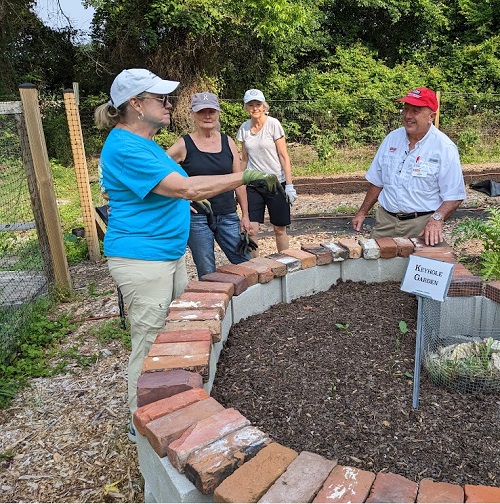
Youth programs are a vital part of NC Cooperative Extension centers. From summer camps and 4-H clubs to field trips and regional activities, these centers provide resources for both youth and parents.
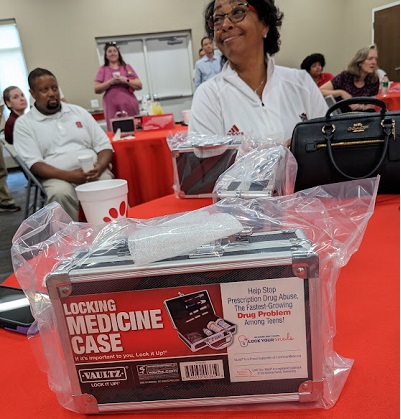
Tour stops also included visits to the Agromedicine Institute, Sentinenel Landscape and Hoffman Forest, and a guided tour of a master planned community in West Newbern.